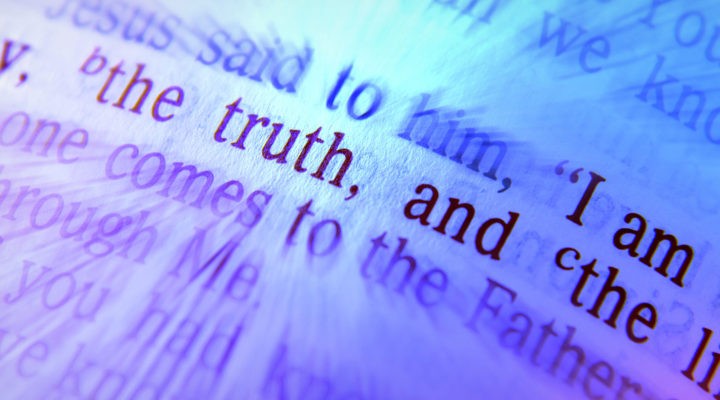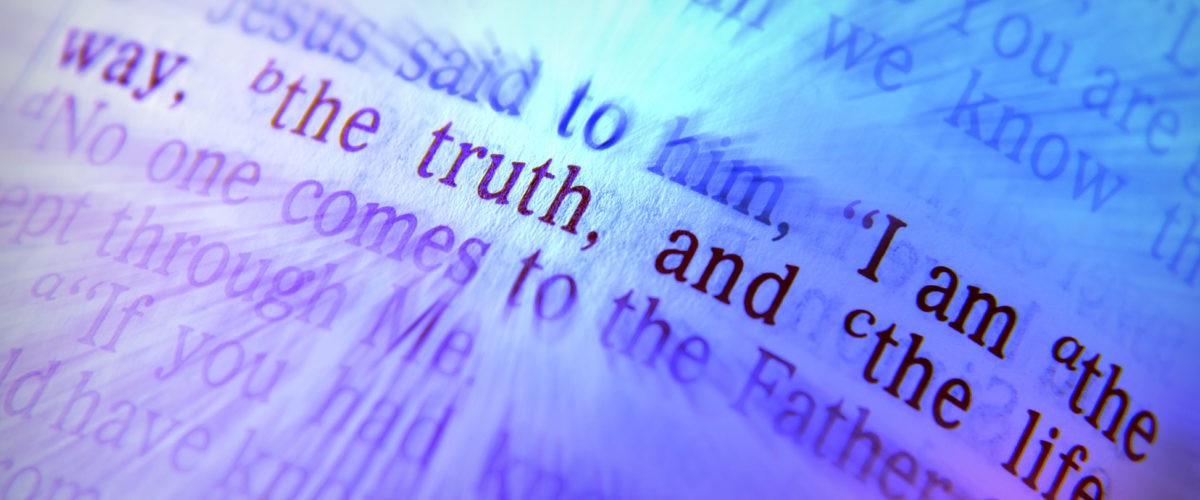It was the fall of 1975, in my class in Old Testament at Southern Baptist Theological Seminary in Louisville, Ky. Gentle and soft-spoken, Page Kelley was explaining the plight of the biblical translator.
We have the Septuagint, a Greek translation of the ancient Hebrew completed two centuries before the birth of Jesus. Then we have the equally ancient Dead Sea Scrolls discovered at Qumran. Finally, we must grapple with the Masoretic text, compiled between the ninth and 11th centuries by Jewish rabbis. In order to translate any particular passage, Kelley explained, scholars must navigate thousands of variant readings which, in many cases, can’t be squared with one another.

Alan Bean
Then he said it: “You may have heard that, if there’s a single error in the Bible, you’ve got to throw the whole thing out. Well, if that’s true, you have to throw the whole thing out!”
Seventeen years later, Kelley made the move from Southern Seminary to the newly formed Baptist Theological Seminary at Richmond. A conservative scholar in the estimation of his peers, Kelley was committed to the truth and authority of the Bible. But he wasn’t willing to teach that the Bible spoke with one voice on every question, or that a literal reading of Genesis 1-11 meant saying “no” to modern science.
Al Mohler, then the newly minted president of Southern Seminary, had no such qualms. Mohler’s commitment to the principle of biblical inerrancy was so uncompromising that he would eventually declare that the earth is 6,000 years old and that the “apparent age” of the planet is a consequence of the fall.
If we allow the scientific consensus to overrule Genesis, Mohler says, “we will face the destruction of the entire gospel.”
Inerrancy and American evangelicalism
The doctrine of biblical inerrancy is a standard feature of American evangelicalism.
Some evangelicals restrict inerrancy talk to the theological and moral claims of the Bible. But American evangelicals in good standing must sign off on some version of biblical inerrancy. In most cases, this means affirming the 1982 Chicago Statement on Biblical Inerrancy, which says the Bible is free of error “about God’s acts in creation, about the events of world history, and about its own literary origins under God.”
“The doctrine of biblical inerrancy is a standard feature of American evangelicalism.”
A recent survey found 31% of American adults subscribe to “young earth creationism,” the belief that humans were created in their present form in 4004 BCE or thereabouts. Among weekly worshipers, support for young earth creationism soars to 69%.
To put this in perspective, in the United Kingdom only 17% of adults identify as young earth creationists. In America, 2% of scientists defend this position (and many of them are affiliated with evangelical groups like Answers in Genesis).
Why are American evangelicals so committed to the doctrine of biblical inerrancy? There are several reasons — some good, some bad, some downright ugly.
Ontological reasons
Ontology is the study of being. Christians begin with the existence of a God who is all-knowing, all-powerful and supremely loving.
The scientific enterprise doesn’t reckon with the divine. The scientific method can only engage with the observable and the measurable, which leaves God out of the picture.
The fact that the vast majority of scientists conceive the universe in essentially agnostic terms is deeply troubling to many people of faith. The doctrine of biblical inerrancy (especially when linked to young earth creationism) is salve to the wounds of evangelical anxiety. The creative power of God may not be apparent to the scientific community, true believers assert, but it’s all right there in the Bible.
Logical reasons
The doctrine of biblical inerrancy follows a logic of perfection.
If the biblical God is “perfect in power, in love and purity,” the self-revelation of God should reflect this perfection. A perfect God cannot be revealed by a book marred by misinformation.
“The either-or, black-and-white rhetoric of biblical inerrancy is rooted in this logic of perfection.”
The either-or, black-and-white rhetoric of biblical inerrancy is rooted in this logic of perfection.
Doxological reasons
Champions of biblical inerrancy portray a cage match between their vision of a glorious God and a godless scientism. If the scientists are right about the big bang and biological evolution, they argue, the biblical vision of God is reduced to ashes.
Alternatively, a worldview rooted in the glory of God must rebel against a cold empiricism. When we go limping between two opinions, when we serve two masters, our hearts are anxious and our worship is perfunctory. True science, like true worship, must begin with the glory of God; all other ground is sinking sand.
Etiological reasons
Inerrantists focus on the headwaters of faith. A building is only as stable as its foundations.
How do we know about God, creation and the fall and salvation of our race? On what authority do we speak of the fires of hell or the glories of heaven? Either God has revealed these things in the Bible, or we are utterly in the dark.
“Our hope is built on nothing less than Jesus’ blood and righteousness,” but without the Bible we have no Jesus. That’s why Christians are called “the people of the book.”
Pedagogical reasons
In the early years of his ministry, Billy Graham was plagued by doubt. At the urging of his old friend, Charles Templeton, he was reading neo-orthodox theologians like Karl Barth and Reinhold Niebuhr, scholars who freely admitted the Bible is characterized by theological diversity and internal contradiction.
“I’ve discovered something in my ministry,” Graham told Templeton. “When I take the Bible literally, when I proclaim it as the word of God, my preaching has power. When I stand on the platform and say, ‘God says,’ or ‘The Bible says,’ the Holy Spirit uses me. There are results. Wiser men than you or I have been arguing questions like this for centuries. I don’t have the time or the intellect to examine all sides of the theological dispute, so I’ve decided once for all to stop questioning and accept the Bible as God’s word.”
“The struggle to reconcile what you learned at a secular university with what you were taught in seminary with what you imbibed in Sunday school can be exhausting.”
As every educated pastor knows, the struggle to reconcile what you learned at a secular university with what you were taught in seminary with what you imbibed in Sunday school can be exhausting. You find yourself plowing through snowdrifts of cognitive dissonance. If, like Billy Graham, you can place all your chips on the Bible and spin the wheel, ambiguity gives way to simplicity.
Sociological reasons
The doctrine of biblical inerrancy provides theological guardrails for the church. So long as they preach and teach an inerrant Bible, evangelical leaders are granted a measure of interpretive freedom.
But those who question inerrancy are severely dealt with, often in traumatizing and career-ending fashion. Some evangelical leaders who formally ascribe to biblical inerrancy also believe the earth is 4.5 billion years old, endorse biological evolution, support LGBTQ rights and advocate the ordination of women. Most of the controversies within American evangelicalism result from attempts to thwart this kind of highwire balancing act.
It is no longer enough to sign the Chicago Statement on Biblical Inerrancy; you must also agree that an inerrant Bible means a young earth, no evolution, zero tolerance for LGBTQ folk, and, above all, no women in positions of authority.
“Most growing congregations hold to a supernatural theology complete with demons, angels and declared opposition to spiritual wickedness in high places.”
A degree of ruthlessness is required because churches that are weak on biblical authority have been declining for decades while the orthodox stride confidently from glory-to-glory. Until recently, it was hard to argue. Even today, with evangelical churches spiraling into a deep demographic dive, most growing congregations hold to a supernatural theology complete with demons, angels and declared opposition to spiritual wickedness in high places.
This brand of spirituality, incidentally, inspired the January 6 insurrection.
Mythological reasons
Suppose you believe the United States of America is God’s shining city on a hill, but you are troubled by a few inconvenient facts: the ethnic cleansing of the native population, the horrors of enslavement and Jim Crow segregation, the patriarchal denigration of women, and all the other depredations that have been visited upon vulnerable people in the course of our nation’s troubled history.
The doctrine of biblical inerrancy is here to help. It has been used to justify enslavement, ethnic cleansing, patriarchy and homophobia.
If the holy God revealed in our inerrant Bibles endorses these things (or at least fails to condemn them), they must be OK, even righteous. The logic of inerrancy has been used to underwrite injustice for centuries and is resurgent.
Demagogical reasons
Demagogues are rarely religious. They don’t like the competition.
But successful demagoguery requires one tap into popular resentment. If you were to draw a Venn diagram comparing the 31% of the voting population that believes in young earth creationism with the 34% who admire Donald Trump, the overlap would be almost perfect.
A stout defense of biblical inerrancy is a sure path to winning the undying love of aggrieved white evangelicals.
The way forward
Moderate-to-progressive Christians are mystified by the abiding appeal of biblical inerrancy. Our typical response is to list all the reasons why, to paraphrase Christian Smith, inerrancy makes the Bible impossible.
But when we imagine ourselves into the hearts and minds of ordinary people, the resilience of the doctrine makes a lot of sense. Forced to choose between the holy writ and what they perceive to be a sneering scientism, they will go with the Bible. Every time.
But what happens when the logic of perfection yields to the logic of love? That’s for next time.
Alan Bean serves as executive director of Friends of Justice. He is a member of Broadway Baptist Church in Fort Worth, Texas.
Related articles:
How the Chicago Statement on Biblical Inerrancy became a litmus test | Analysis by Rick Pidcock
Why biblical inerrancy should be a litmus test | Analysis by David Bumgardner


